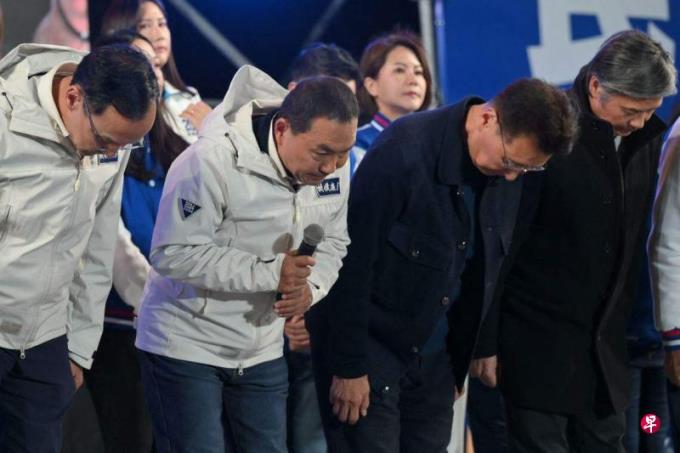
No accident, the Democratic Progressive Party won the Taiwan election again, breaking the election spell that will rotate once in eight years.
Based on the "Police Police" of major media, polls, and election forecasting platforms before January 3, the DPP represented by Lai Qingde's continued ruling is a high probability event.Although the Kuomintang represented by Hou Youyi was defeated, compared with the last defeat of the legislator election, he had a good gain.As for the "Third Forces" people's party, candidate Ke Wenzhe may get 2 million to 3 million votes and become a key minority in the political situation in Congress.
After all, the polls are scientific and rational representatives, and in the words of the election results, but they are underestimated by Ke Wenzhe's votes.
However, in this election that determines the fate of various political parties in Taiwan, the Kuomintang, one of the two major political parties, is not surprising, but it is also intriguing.
In the election of local public officials in Taiwan two years ago, the Kuomintang in the wild seemed to have nine -in -eight wastes, and the situation in the world.Not only did the restore in Taipei and Taoyuan's two important land lost, they also forced the DPP to retire to only 5 counties and cities in governance. In terms of obtaining votes, about 4.77 million votes were won with approximately 5.7 million votes.
For this reason, only one year later, the Kuomintang lost more than 900,000 votes in the election, which was a bit incredible.Even if many polls have predicted that the Kuomintang fails, it is nothing more than 200,000 to 500,000 votes.If the "abandonment effect" occurs, the voters abandon Ke Wenzhe on the day of the voting day, and the selection of voting is more likely to achieve Hou Youyi, which is rotated by political parties, and the Kuomintang still has the possibility of turning over.
Where is the question?Ke Wenzhe, who is not necessary to blame as the "third forces", does not support "blue and white", but is a problem of cross -strait issues that the Kuomintang is still difficult to solve.This problem is not only the "God Lord" of the Democratic Progressive Party, but also reflects the great dilemma of the people in Taiwan.
As early as the last century, Worcester, an expert in the British public opinion survey, proposed based on the 1987 British election data, more than 44%of voters, especially middle voters, pay attention to political parties and policies. 35%of voters emphasize emphasizedImpression of candidates.The report pointed out a serious issue, that is, the political parties' positions and policies are more than all in the national level election.American political scholar Richard Joslyn found that 57%of voters were more concerned about the personal quality and interests of candidates after many investigations on local candidates.And policy.Therefore, in local elections, the characteristics of the candidate themselves are greater than everything.
This naturally answers the huge gap between the Kuomintang in just over a year.
In local elections, the good image of the candidates promoted by the Kuomintang, high -quality voters services, and intricate interests with various local groups are naturally smooth in election results.However, at the election level, once the political parties and policies are involved and dominated, the DPP has taken the lead.
After all, in the eyes of voters, the maximum difference between the Kuomintang and the DPP is nothing more than "cross -strait issues".Even though the Kuomintang claims that the "1992 Consensus" is the "one of the Chinese China", it still cannot offset the doubts of the people in the hearts of "voting the Kuomintang and becoming Hong Kong" in Taiwan.The slogan of the DPP's campaign in this election has also led many middle voters to support the Kuomintang in the local elections to wander and give up voting or turn to voting.It is no wonder that in April 2023, the Taiwan Public Opinion Foundation investigated the attitudes of the people of Taiwan on the "1992 Consensus" related issues, and up to 67.1%of the people did not support the core concept of the "1992 Consensus".Supporters are only 22.5%.
Therefore, compared to the DPP's "Taiwan faction" position, the Kuomintang cannot propose a suitable cross -strait discussion, which is not only difficult to convince the entire party, but also difficult to convince Taiwanese voters.Even in this election, the Kuomintang's concept of "war and peace" and "pro -beauty and land" has no way to explain the fact that Tsai Ing -wen has not caused war for eight years, and overcomes the people from Hong Kong in 2019 to "counter -delivery in China."Doubt about mainland China after the incident.
Perhaps, the "1992 consensus is a consensus with no consensus" proposed by the Kuomintang Chairman Zhu Lilun during his visit to the United States in June 2022, which is the best portrayal of this century -old party on cross -strait issues.After these elections, the political structure of Taiwan's "North Blue South Green Decisive Battle" may also evolve into a significant leader in local elections in the future.
However, the Taiwan election has ended, and it is necessary to self -review by the defeat, but the candidate may not be able to laugh.
Internal factions, corruption black gold, external Sino -US struggle, and doubt in war are all spells under the DPP to continue the main administration.At the same time, about 40%of the votes caused the difficulty of Chao Xiaoye. Lai Qingde, who represents the general public opinion, will bring the Taiwan that will sink in the division of society.fuse.



